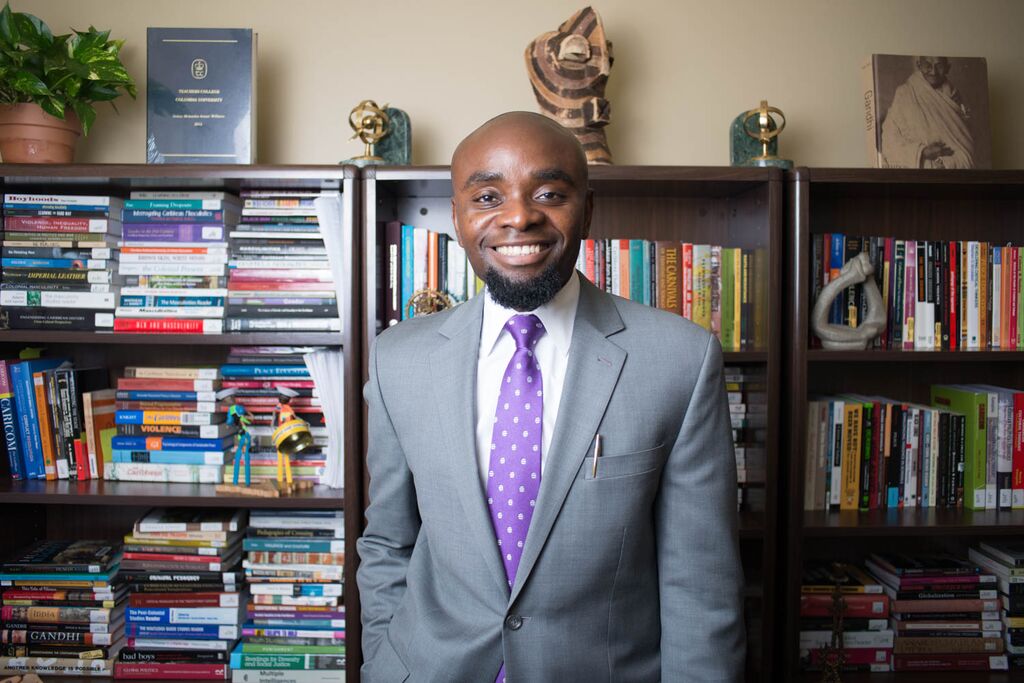In 2019, when alumnus Hakim Mohandas Amani Williams received Teachers College’s Early Career Award, he paid tribute to his mother, Celia, calling her “a lioness,” and his grandmother, “whose spirit is conjoined to that pantheon of ancestors that, come what may, refuse to capitulate to a world that said ‘No’ far too many times.”
That kind of resilient spirit continues to guide Williams (Ed.D. ’12), a ground-breaking peace educator who recently received a U.S. Fulbright Scholar Program Award for his project “Decolonial Peace and Justice Education: A Transatlantic Study of Four Afro-centric, Youth-based Organizations.”
“I hope to highlight the audacious political work of Black youth amidst a colonially-constructed, global environment that has long been perturbed by Black resilience,” Williams told reporter Ali Dayton of The Gettysburgian, a publication of Gettysburg College, where he serves as Associate Professor of Africana Studies and Director of Peace and Justice Studies. (He also is an Adjunct Associate Professor at TC.)
Williams is known in his field for advocating a new “critical peace education” that focuses on power and structural inequality at a time when, as he has put it, flows of global capital have taken precedence over a focus on human rights violations and environmental degradation.
As a doctoral student at Teachers College, he studied with peace education faculty member Monisha Bajaj (now at the University of San Francisco) and Peter Coleman, Director of TC’s Morton Deutsch International Center for Cooperation and Conflict Resolution. He credits TC as the place where he received “a vocabulary to name and decode the violence in which I grew up and to connect that analysis to the globalized violence of the colonialism of yesteryear and today.”
Subsequently, in an analysis of violence in schools in his home country of Trinidad and Tobago, Williams focused chiefly on the schools’ structural role rather than on students, addressing an omission that he argues has reinforced the country’s highly stratified class structure (a legacy from colonial times) and perpetuated educational inequity. He has since continued to work in Trinidad and Tobago with local youth and families.
Watch a video of Williams talking about his ongoing work in Trinidad and Tobago.
And Williams’ focus on power and structural inequality extends beyond education. Speaking at the Peace and Justice Studies Association (PJSA) in 2012, he framed global climate change as an extension of colonialism.
“Caribbean countries, with smaller economies, are feeling the brunt of climate change,” he said. “The richer countries — who are rich from colonialism — are putting out more carbon emissions, and who’s going to suffer more? The countries that are poorer.”
I hope to highlight the audacious political work of Black youth amidst a colonially-constructed, global environment that has long been perturbed by Black resilience.
—Hakim Mohandas Amani Williams (Ed.D. '12), recent Fulbright recipient
At Gettysburg over the past several years, in courses ranging from Introduction to Caribbean Studies to Human Rights Policy and Practice, Williams has taken many of his students on service learning trips to Trinidad and Rwanda.
In accepting the TC award two years ago, Williams recalled that violence is so commonplace in Trinidad and Tobago, where he grew up in one of the poorest and most dangerous communities, that he took the middle names “Mohandas,” after his hero, Mahatma Gandhi, and “Amani,” which in Swahili means “peace.”
Watch a video of Williams accepting TC’s Early Career Award.
He said that his work is fed from a rich reservoir of ancestral history that includes the Atlantic slave trade, the Caribbean, Brazil and the American South.
He now plans to use his new Fulbright funding to conduct research in Ghana, Brazil, Jamaica and, here in the United States, Georgia — all sites that were dramatically affected by the transatlantic slave trade.
“My research aims to document how Black youth conceptualize globalized anti-Blackness,” he says, “and how they mobilize Black pride toward political action and transnational solidarity.”
